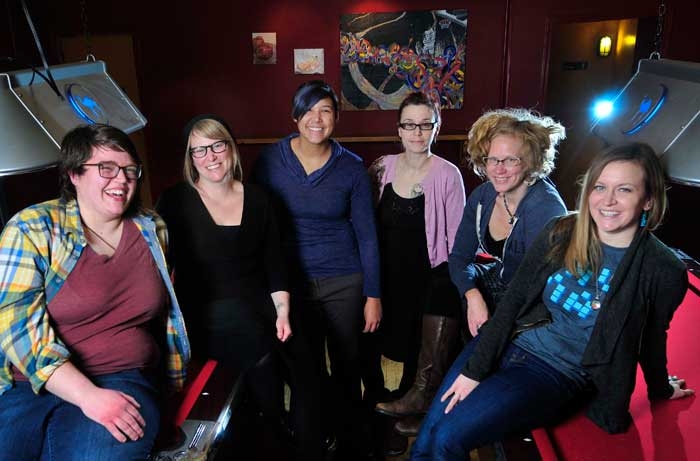For the past three years, LadyfestGR organizers Jes Kramer and Steffanie Rosalez have scoured West Michigan communities to find some of the best females to include in their lineup.
Each year, however, they are met with the same obstacle. Finding enough female musicians – especially bands where every member identifies as a woman – is a taller order than it seems.
“I wouldn’t say there’s a lack of females performing, but it’s definitely not the majority,” said Kramer, who has been performing her own music as a solo artist and in collaborations since she was 14. “I guess the question I keep coming back to is, 'Why do I feel like we need more?' Is it the fact that they’re not a majority? I don’t feel like they’re getting less attention, but there’s still something that feels really unequal.”
It also turns out that pointing to any visible source of inequality is much harder than it seems. For local music, success isn’t easily defined by a Billboard Hot 100 list. Rather, by a position of social, cultural and aesthetic influence, which is difficult to quantify. For female musicians across West Michigan, however, the sense that they are fighting to prove themselves in a male-dominated industry is very much tangible, even if it is somewhat subconscious.
“It’s a weird thing because when I compare myself to male standards within singing, I don’t feel inferior, but when it comes to being a musician and playing my instrument, which is piano, I definitely feel like it’s hard to compete with the guys for some reason, which typically is not true,” said Ashley Daneman, a modern jazz musician based in Kalamazoo.
For Daneman, this means the “old boys network” of 1950s-era jazz culture is still alive and well not only in Kalamazoo, but in jazz communities in the other cities she has lived and performed in, like Washington, D.C., New York City and Cincinnati.
Despite (or perhaps, in spite) of it all, she’s made a name for herself not only with audiences, but has also been recognized by leading musical authorities in the jazz music world through grants and artist residencies with places like The Banff Centre’s Jazz and Creative Workshop and the Betty Carter’s Jazz Ahead at the Kennedy Center.
Suffice to say, Daneman is no rookie – but even with an impressive roster like hers, being a woman means often times, she still has to prove it.
“I feel like I’ve done a lot myself to overcome that gap,” she said. “I’ve been more proactive so that people know I know what I’m doing.”
So, what would a male jazz musician have to say about this perceived imbalance.
“Obviously, I don’t know personally because I’ve never done the Some Like It Hot thing, but I’m sure there’s a battle going on for female instrumentalists in working to prove yourself as a valid artist and to get the respect men do,” said Benje Daneman, who is both Ashley’s husband and a noted jazz trumpeter who was performed with legends like Doc Severinsen and his Big Band and helped to co-found the new Kalamazoo Jazz and Creative Institute with his wife and their colleague, Nich Mueller.
“(Women) are fighting a different fight than men have to,” he said, adding across all genres, including jazz, women are often valued by audiences for the wrong reasons. “They’re still fighting to prove they are strong enough and that they’re not just a sex symbol, they’re also strong musicians.”
OVERCOMING THE STEREOTYPE
The all-female pop-punk trio, Bermudas, know firsthand what a thin line women have to walk when overcoming a hyper-sexualized stereotype.
“We were out of town playing a show in Cleveland and some guy -- he was intoxicated, I'm sure -- he proceeded to come up on stage before we started and tuck money in our shirts,” said Charity Lytle, bassist for the band.
Drummer DezaRae Russ recalled another show where an intoxicated male was yelling sexually aggressive things her sister and Bermudas guitarist, Dennielle.
Those interactions make for a tricky situation, Dennielle said, because they know those things are disrespectful, but they’re also making a first impression to room full of strangers.
“I didn't want to be like a total snot right before you start a show,” Dennielle said. “You want to keep everything positive because otherwise, it would ruin the whole mood of what we were about to do.”
Though situations like those are in the clear minority for Bermudas, the fact is, there is an even slimmer chance of being objectified in that same, obvious way for male musicians playing the same room.
CHANGING THE CONVERSATION
If pop culture sets the example, then according to Grand Rapids hip-hop artist Linda Tellis, it's time for those voices on the radio to change the conversation and set a new example.
Tellis, who is Lady Ace Boogie to her fans, has quickly become a well-known figure in both hip-hop and local activism in Grand Rapids. She released her first full album, Feel Good Music, last March and fills her set lists with songs that aim to break the kind of “get-money-get-laid” sentiment that is popular in a lot of mainstream rap today.
“I believe in being persistent and I believe in being pure and honest and genuine and having a direction to go in,” she said. “I think that will take you a long way.”
With a full-time job at Cascade Engineering, Tellis is also developing a youth program called Youth Outlet and has her own startup business called “Think 50/50.” She is active in the Grand Rapids community and said although public visibility has gone a long way in garnering such a loyal following so quickly, openness to embracing the moment has been key.
“Be present in the moment and not in the hype,” she said. “Be genuine and make music for everyone, but be yourself … because the world is in need of advocates for life change, so I would say focus on that. It might not seem like a cool thing right now, but it will, because people want that refreshment of good, positive energy, but also good music.”
BUILDING BETTER GROUP DYNAMICS
In an effort to foster a new generation of girls with a more positive collaborative dynamic, Kramer has volunteered with another nonprofit program founded by Rosalez last year in August. Girls Rock Grand Rapids is a week-long day camp that seeks to empower girls ages 8 to 16 through music, giving them an authentic look at the process of forming a rock band, including instrument lessons, workshops, band practice and an end-of-camp rock show complete with a recording session.
“It was so powerful to see how differently the girls acted and how differently they felt about themselves in an all-girl environment,” Rosalez said, adding there is something about our culture that teaches girls to be overly critical of one another.
“I was one of the band coaches and my girls were writing a song and one of the girls wrote a part that the other girls didn't like and they were like ‘Yeah, we don't like that.' And she got really mad and was saying 'You're just saying that because you don't like the shirt I'm wearing,’ and it turned into this whole thing about fashion and 'She's jealous of me because of my braids,' and it was just crazy to see how those interactions went,” Rosalez said.
With Girls Rock Grand Rapids, however, she and other organizers are able to create an environment where girls and women have to figure out how to work with each other through conflict in a more constructive way.
THE VERDICT
It’s clear the local music scene may still be male-dominated, but the female musicians that are around are both vibrant and vocal. Still, the bottom line is, just like it is tricky to quantify success in local music, it is even trickier to quantify talent – both are concepts that are just totally subjective to the individual.
According to Ashley Daneman, “the biggest limitations are the ones we put on ourselves,” and by all accounts, she’s right. If local music does, in fact, have its own version of the glass ceiling, then it’s up to music’s leading ladies to move forward by totally ignoring it.
What that means for local female musicians is making one united front. It means fostering a supportive local climate, being exactly who you are and doing so unapologetically.
“I think when you’re surrounded by people that want you to be something or think you’re something, they’ll treat you like something other than who you are exactly,” said Benje Daneman. “I think it comes down to not selling yourself short and not trying to be anyone else. From there, people are going to be attracted to you and the right people will want to be around you and appreciate you exactly how you are. I think that goes for anybody, but especially for women in a male-dominated world.”





